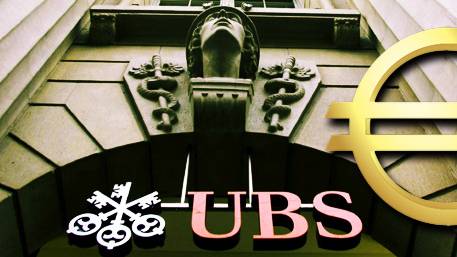UBS Quantifies Costs Of Euro Break Up, Warns Of Collapse Of Banking System And Civil War
Source: businessinsider.com
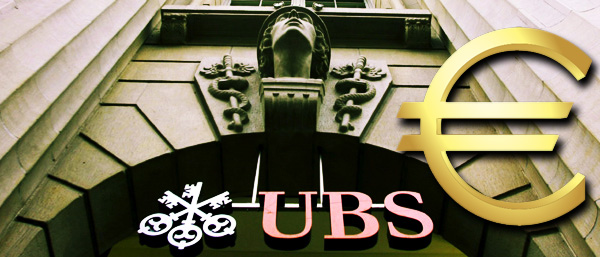
UBS’ Stephane Deo, Paul Donovan, and Larry Hatheway have released a monster report (posted over at ZeroHedge) examining the consequences of a Euro breakup, a once unlikely-seeming outcome that now grows more likely by the day.
The first line basically nails it:
The Euro should not exist (like this)The report argues that basically the whole system, right from the start, was basically a lie:
Under the current structure and with the current membership, the Euro does not work. Either the current structure will have to change, or the current membership will have to change.
The problem with the EuroUltimately, even at this dire moment, UBS still has a hard time seeing a breakup, calling some kind of fiscal union more likely. The major reason: It would just be too economically costly for anyone to depart.
Why consider break-up at all? Break-up occurs because the Euro does not work. Member states would be economically better off if they had never joined. European monetary union was generally mis-sold to the population of the Europe. In the 1990s the Euro was often characterised as an instance of foreign exchange rate integration – the Exchange Rate Mechanism without the crises. The advantages of no foreign exchange rate uncertainties or costs for trade and tourists were emphasised. Of course the exchange rate integration was probably the least of the consequences of the Euro. The most important consequence was the integration of monetary policy. The hint was in the name “European Monetary Union”. However, politicians sought to ignore that hint. A Euro that had been promoted on the idea of monetary union rather than exchange rate integration would have been far more difficult to sell to the electorate.
A monetary union is, economically speaking, a “good” idea if the membership constitutes an optimal currency area. This occurs under one of two conditions. Either the area is so homogenous that the component economies all move in the same direction at roughly the same speed, at the same time. Alternatively, the economies are sufficiently flexible that any differences in economic performance can be relatively swiftly corrected.
Fiscal confederation, not break-upZeroHedge writes:
Our base case with an overwhelming probability is that the Euro moves slowly (and painfully) towards some kind of fiscal integration. The risk case, of break-up, is considerably more costly and close to zero probability. Countries can not be expelled, but sovereign states could choose to secede. However, popular discussion of the break-up option considerably underestimates the consequences of such a move.
The economic cost (part 1)
The cost of a weak country leaving the Euro is significant. Consequences include sovereign default, corporate default, collapse of the banking system and collapse of international trade. There is little prospect of devaluation offering much assistance. We estimate that a weak Euro country leaving the Euro would incur a cost of around EUR9,500 to EUR11,500 per person in the exiting country during the first year. That cost would then probably amount to EUR3,000 to EUR4,000 per person per year over subsequent years. That equates to a range of 40% to 50% of GDP in the first year.
The economic cost (part 2)
Were a stronger country such as Germany to leave the Euro, the consequences would include corporate default, recapitalisation of the banking system and collapse of international trade. If Germany were to leave, we believe the cost to be around EUR6,000 to EUR8,000 for every German adult and child in the first year, and a range of EUR3,500 to EUR4,500 per person per year thereafter. That is the equivalent of 20% to 25% of GDP in the first year. In comparison, the cost of bailing out Greece, Ireland and Portugal entirely in the wake of the default of those countries would be a little over EUR1,000 per person, in a single hit.
The political cost
The economic cost is, in many ways, the least of the concerns investors should have about a break-up. Fragmentation of the Euro would incur political costs. Europe’s “soft power” influence internationally would cease (as the concept of “Europe” as an integrated polity becomes meaningless). It is also worth observing that almost no modern fiat currency monetary unions have broken up without some form of authoritarian or military government, or civil war.
Do monetary unions break up without civil wars?
The break-up of a monetary union is a very rare event. Moreover the break-up of a monetary union with a fiat currency system (ie, paper currency) is extremely unusual. Fixed exchange rate schemes break up all the time. Monetary unions that relied on specie payments did fragment – the Latin Monetary Union of the 19th century fragmented several times – but should be thought of as more of a fixed exchange rate adjustment. Countries went on and off the gold or silver or bimetal standards, and in doing so made or broke ties with other countries’ currencies.
If we consider fiat currency monetary union fragmentation, it is fair to say that the economic circumstances that create a climate for a break-up and the economic consequences that follow from a break-up are very severe indeed. It takes enormous stress for a government to get to the point where it considers abandoning the lex monetae of a country. The disruption that would follow such a move is also going to be extreme. The costs are high – whether it is a strong or a weak country leaving – in purely monetary terms. When the unemployment consequences are factored in, it is virtually impossible to consider a break-up scenario without some serious social consequences.
With this degree of social dislocation, the historical parallels are unappealing. Past instances of monetary union break-ups have tended to produce one of two results. Either there was a more authoritarian government response to contain or repress the social disorder (a scenario that tended to require a change from democratic to authoritarian or military government), or alternatively, the social disorder worked with existing fault lines in society to divide the country, spilling over into civil war. These are not inevitable conclusions, but indicate that monetary union break-up is not something that can be treated as a casual issue of exchange rate policy.
Even with a paucity of case studies, what evidence we have does lend credence to the political cost argument. Clearly, not all parts of a fracturing monetary union necessarily collapse into chaos. The point is not that everyone suffers, but that some part of the former monetary union is highly likely to suffer.
The fracturing of the Czech and Slovak monetary union in 1993 led to an immediate sealing of the border, capital controls and limits on bank withdrawals. This was not so much secession as destruction and substitution (the Czechoslovak currency ceased to exist entirely). Although the Czech Republic that emerged from the crisis was considered to be a free country (using the Freedom House definition), with political rights improving relative to Czechoslovakia (also considered to be a free country), Slovakia saw a deterioration in the assessment of its political rights and civil liberties, and was designated “partially free” (again, using Freedom House criteria).
Similarly the break-up of the Soviet Union saw authoritarian regimes in the resulting states. Of course, this was not a change from the previous status quo, but that is not the point. The question is not how a liberal democracy develops, but whether a liberal democracy could withstand the social turmoil that surrounds a monetary union fracturing. We lack evidence to support the idea that it could.
Even the US monetary union break-up in 1932-33 was accompanied by something close to authoritarianism. Roosevelt’s inauguration was described by a contemporary journalist as being conducted in “a beleaguered capital in wartime”, with machine guns covering the Mall. State militia were called out to deal with the reactions of local populations, unhappy at what had happened to the monetary union (and specifically their access to their banks).
Older examples are less helpful, as they tend to be more akin to fixed exchange rate regimes under a gold standard or some other international monetary arrangement. Nevertheless, the Irish separation from the UK, or the convulsions of the Latin Monetary Union in Europe (particularly around the Franco-Prussian war in 1870 and its aftermath) saw monetary unions fragment with varying degrees of violence in some parts of the union.
Writing in 1997, the Harvard economist Martin Feldstein offered a view that seems to be somewhat chillingly precognitive. He said “Uniform monetary policy and inflexible exchange rates will create conflicts whenever cyclical conditions differ among the member countries... Although a sovereign country... could in principle withdraw from the EMU, the potential trade sanctions and other pressures on such a country are likely to make membership in the EMU irreversible unless there is widespread economic dislocation in Europe or, more generally, a collapse of the peaceful coexistence within Europe.” (emphasis added).
Our base case for the Euro is that the monetary union will hold together, with some kind of fiscal confederation (providing automatic stabilisers to economies, not transfers to governments). This is how the US monetary union was resurrected in the 1930s. It is how the UK monetary union, and indeed the German monetary union, have held together.
But what if the disaster scenario happens? How can investors invest if they believe in a break-up, however low the probability? The simple answer is that they cannot. Investing for a break-up scenario has not guaranteed winners within the Euro area. The growth consequences are awful in any break-up scenario. The risk of civil disorder questions the rule of law, and as such basic issues such as property rights. Even those countries that avoid internal strife and divisions will likely have to use administrative controls to avoid extreme positions in their markets.
The only way to hedge against a Euro break-up scenario is to own no Euro assets at all.
Alas, this will be the final outcome. Unfortunately trillions more in taxpayer capital will be lost before we get there.Ed Comment: I couldn’t agree less with ZeroHedge on this point. This is NOT and unwitting action from the Swiss global financial services company. I argue that they know exactly what they are doing and they know that this will further destabilize and create uncertainty around a failing union and currency.
In the meantime, enjoy as UBS just unwittingly announced the final countdown for the EUR.
Why would they do this? Because the Eurozone wants tighter control and reform. They seek a stronger grip around the nations of Europe and this is the perfect time to do it. The Eurocrats want MORE control - and this is how they seek to get it. In time of great crisis you make the greatest reforms. This "Euro-Problem" will be the excuse they need to bring in more legislation, more regulation and more control.
The three keys from Basel and the Gnomes of Zürich know what they are doing.
In 1998, SBC merged with Union Bank of Switzerland in 1998, to form UBS, the largest bank in Europe and the second largest bank in the world. The company’s logo, which featured three keys, symbolizing "confidence, security, and discretion", was adopted by UBS. More: Swiss Bank Corporation
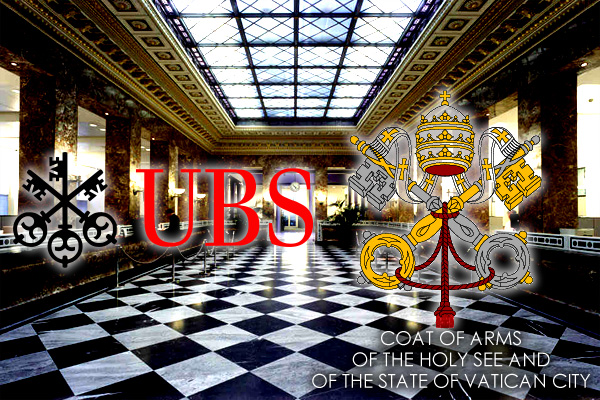
This is the EU "threshold". If countries like Germany, Sweden and others who are paying for the PIGS don’t leave the union now, they never will.
I believe they won’t, because the orders are coming from elsewhere.
Red Cross, Templars, World Economic Forum, Swiss/Helvetians & The Vatican
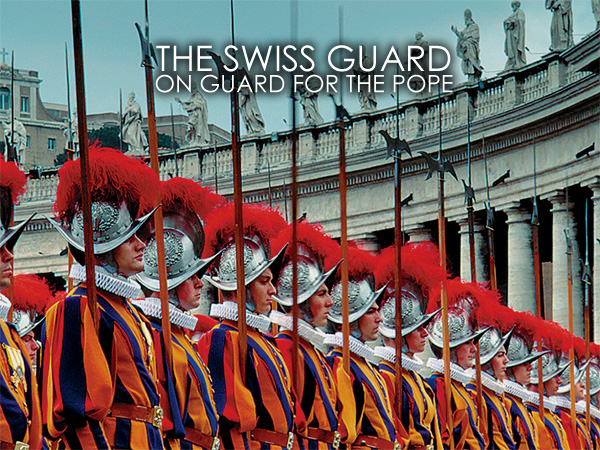
This won’t make the European Union or the Euro to fail - this will make it grow stronger.
Think Phoenix.
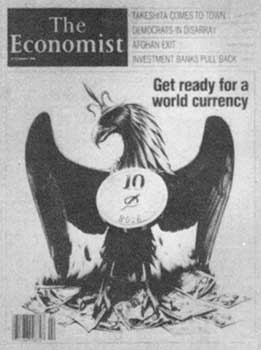
A world currency and a ‘new economic order’ are also part of the elites plans for global governance. Eventually – specifically by 2018 if plans go accordingly – the “Phoenix” will be the world currency. Shown on the cover of The Economist in 1988, a phoenix is standing atop burning paper money symbolizing its rise out of their destruction, with the words “Get ready for a world currency” next to it.
More: EU/US “single market” next stage in Bilderberg/Trilateral plan for world government
Hidden Roots of the European Union
